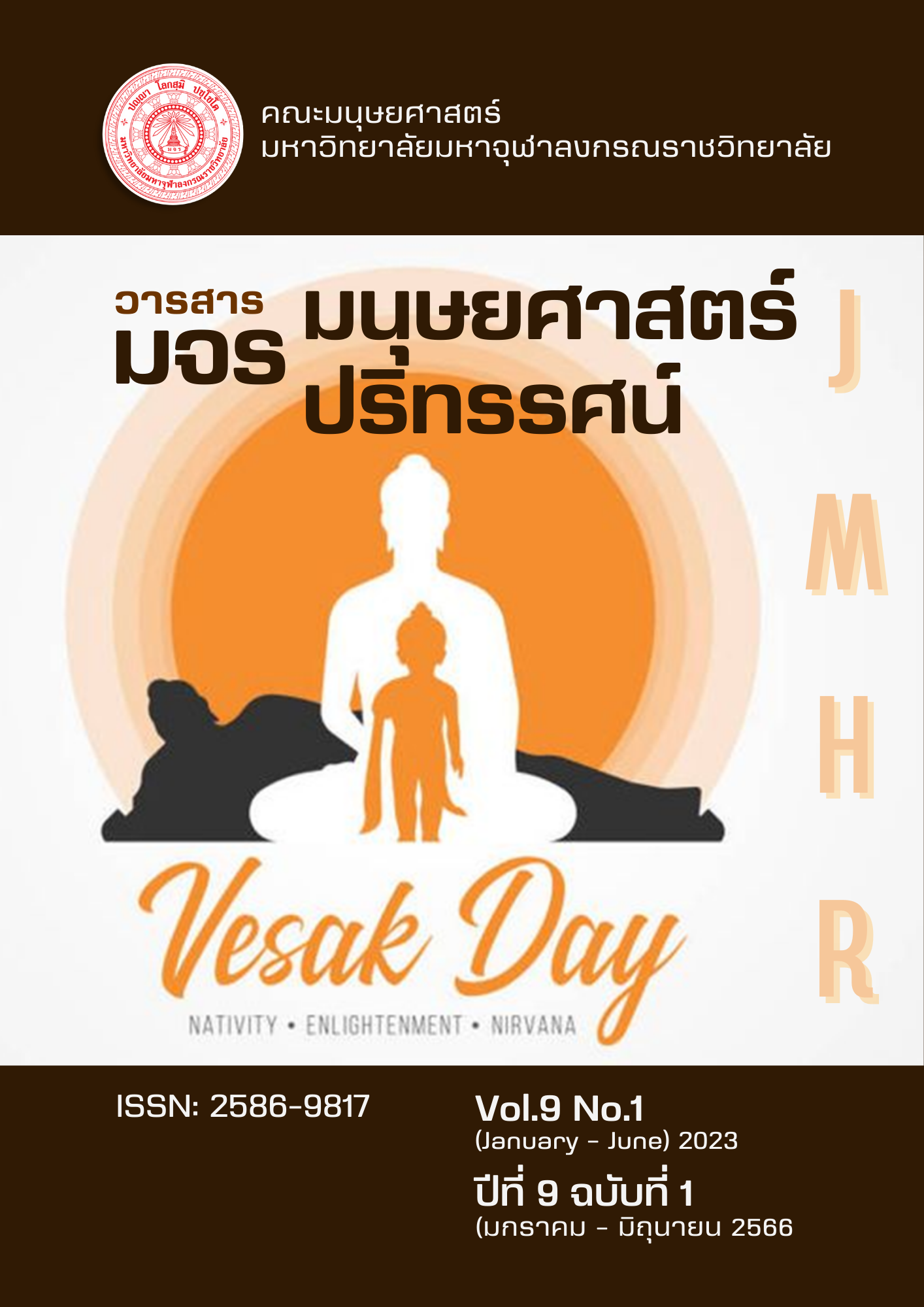รูปแบบความสุขตามแนวพุทธจิตวิทยา รูปแบบความสุขตามแนวพุทธจิตวิทยาของนักธุรกิจหญิงในสังคมไทย
คำสำคัญ:
รูปแบบ, ความสุข, พุทธจิตวิทยา, นักธุรกิจหญิง, สังคมไทยบทคัดย่อ
การวิจัยมีวัตถุประสงค์คือ 1. เพื่อศึกษาความสุขตามแนวพุทธจิตวิทยา 2. เพื่อวิเคราะห์ สังเคราะห์หลักพุทธธรรมและทฤษฎีจิตวิทยาในการพัฒนารูปแบบความสุขตามแนวพุทธจิตวิทยาของนักธุรกิจหญิงในสังคมไทย และ 3. เพื่อนำเสนอรูปแบบความสุขตามแนวพุทธจิตวิทยาของนักธุรกิจหญิงในสังคมไทย สังคมไทย เป็นการวิจัยแบบผสานวิธีระหว่างวิธีวิจัยเชิงคุณภาพ และวิธีวิจัยเชิงปริมาณ โดยใช้แบบสัมภาษณ์เชิงลึกเก็บข้อมูลเชิงคุณภาพจากผู้ให้ข้อมูลสำคัญ จำนวน 20 รูปหรือคน และใช้แบบสอบถามเก็บข้อมูลเชิงปริมาณจากกลุ่มตัวอย่าง จำนวน 384 คน วิเคราะห์ข้อมูลเชิงคุณภาพด้วยการวิเคราะห์เนื้อหาและใช้สถิติวิเคราะห์ข้อมูลเชิงปริมาณ
ผลจากการวิจัย พบว่า
- ความสุขตามแนวพุทธจิตวิทยาประกอบด้วย 2 ตัวแปรที่มีความสัมพันธ์กันในทางบวกอย่างมีนัยสำคัญที่ระดับ .01 ซึ่งทุกหัวข้อต่างมีรูปแบบความสุขตามแนวพุทธจิตวิทยาของนักธุรกิจหญิงในสังคมไทยที่ไม่แตกต่างกัน กล่าวโดยองค์รวม ความสุขของนักธุรกิจหญิงในสังคมไทย คือ การมีความสุขทั้งในตนเอง ในครอบครัว ในองค์กร ในสังคมและมีความสุขอย่างมีสติ
- จากการวิเคราะห์และสังเคราะห์หลักพุทธธรรมและทฤษฎีจิตวิทยาในการพัฒนารูปแบบความสุขตามแนวพุทธจิตวิทยาของนักธุรกิจหญิงในสังคมไทย พบว่า คุณลักษณะของนักธุรกิจหญิงในสังคมไทยตามแนวพุทธจิตวิทยาประกอบด้วย 7 G คือ Good Value, Good Moral, Gratitude, Give, Grow, Gain, Good Sufficiency และ
- รูปแบบความสุขตามแนวพุทธจิตวิทยาของนักธุรกิจหญิงในสังคมไทยเป็นคนที่มีสุขภาพจิตดี มีอารมณ์ดีและเบิกบานเป็นคนคิดบวก มองโลกในแง่ดี สามารถแก้ไขปัญหาต่าง ๆ ที่เกิดขึ้นได้อย่างมีสติมีปัญญา สามารถมองเห็นโอกาสในทุกวิกฤติได้ เกิดภูมิคุ้มกัน นำไปสู่ความสำเร็จ ทำให้มองเห็นคุณค่าของตนเองและส่งมอบความสุขนั้นไปยังผู้อื่นให้มีความสุขได้ง่ายขึ้น มองเห็นความสุขที่แท้จริงได้มากขึ้น สามารถดำเนินชีวิตไปได้ด้วยความสงบสุขอย่างแท้จริง ส่งผลให้คนรอบข้างมีความสุข สังคมมีความสุข และธุรกิจหน้าที่การงานก็ประสบความสำเร็จ การมีความสุขทั้งในชีวิตครอบครัวและการทำงาน ส่งผลให้มีกำลังใจในการปฏิบัติดีต่อไป
เอกสารอ้างอิง
กันตภณ หนูทองแก้ว และ สิทธิพงษ์ เกตุประยูร. (2556). การนำหลักบุญกิริยาวัตถุมาใช้ในวิถีชีวิตของประชาชน อำเภอเมือง จังหวัดนครศรีธรรมราช (รายงานผลการวิจัย). มหาวิทยาลัยมหามกุฏราชวิทยาลัย. นครปฐม.
กรุงเทพธุรกิจ. (2564). “ความสุข” หน้าตาเป็นยังไง? ในโลกวิทยาศาสตร์. สืบค้น 16 มีนาคม 2564, จาก https://www.bangkokbiznews.com/news/detail/904618
โพสต์ทูเดย์. (2564). โควิดฉุดความสุขคนไทยต่ำสุดในรอบ 13 ปี 10 เดือน. สืบค้น 3 มกราคม 2564, จาก https://www.posttoday.com/social/general/620578
ศิริศักดิ์ นันตี. (2559). การบูรณาการการพัฒนาทรัพยากรมนุษย์ตามทฤษฎีตะวันตกกับหลักการทางพระพุทธศาสนา. วารสารมนุษยศาสตร์และสังคมศาสตร์, 23(41), 75-88.
สุวรรณี ไวท์, สิริวัฒน์ ศรีเครือดง และ สุวัฒสัน รักขันโท. (2564). พุทธจิตวิทยากับการพัฒนาตนให้มีความสุข. วารสาร มจร มนุษยศาสตร์ปริทรรศน์, 7(1), 425-466.
อำไพ ลีละรัตนวงศ์ และ สุวัฒสัน รักขันโท. (2564). สุขเกษียณด้วยหลักธรรมตามแนวพุทธจิตวิทยา. วารสาร มจร มนุษยศาสตร์ปริทรรศน์, 7(1), 455-440.
Emmon, R.A.(1986). Personal strivings : An approach to personality and subjective Well-being. Journal of Personality and Social Psychology, 51(2), 1058 - 1068.
Tsou, M.W. and Liu, JT. (2021). Happiness and domain satisfaction in Taiwan, J Happiness studies. Retrieved January 22, 2021, from http://journals.kluweronline.com/,
ดาวน์โหลด
เผยแพร่แล้ว
รูปแบบการอ้างอิง
ฉบับ
ประเภทบทความ
หมวดหมู่
สัญญาอนุญาต
ลิขสิทธิ์ (c) 2023 วารสาร มจร มนุษยศาสตร์ปริทรรศน์

อนุญาตภายใต้เงื่อนไข Creative Commons Attribution-NonCommercial-NoDerivatives 4.0 International License.






